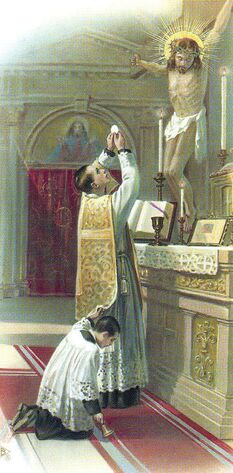
St. Martin, the illustrious Bishop of Tours, being on a visit, upon an affair of business, at the court of Emperor Maximus, was invited, with the priest who accompanied him, to sit down to dinner at the emperor's table. During the repast a cup of wine was poured out and presented to Maximus, who, wishing to do honor to the bishop, ordered it to be first handed to St. Martin, expecting that, when he had tasted, he would return it to him again. To his surprise, however, and of that of the whole court, St. Martin, after he had drunk, passed the cup to his companion, the priest, as being after him the most exalted person in the assembly. So far from being displeased, Maximus applauded this action of the saint, acknowledging that, in the sight of God, who estimates persons at their true value, the imperial is far inferior to the priestly dignity.
The priest announces to us the messages of God, and interprets His divine commandments. He speaks to us, on the part of God, words of consolation, encouragement, counsel, direction, and also reproof, and he continually pleads for us at the throne of grace by the recital of the canonical hours. Truly the office of the priest is an angelic office, or rather is an office far higher than that of the angels, who are but the ministers of God to do His will ; whereas the priest is not only His minister, but His representative upon earth, and a mediator between Him and His people. Hence St. Francis of Assisi was wont to say : "Were I to meet in the street an angel and a priest, I would first bow in reverence to the priest and afterwards in reverence to the angel." And you also, my dear children, when you respectfully bow to salute the priest, or kneel to receive his blessing, show thereby that the same faith which animated the saints burns within your breasts. For you do so because you see with the eyes of your soul Jesus Christ Himself in the person of His priest, and know and feel that though he may be poor and lowly in the eyes of unbelieving men, his sacred character raises him in dignity and honor far above the kings and mighty of the world.
A certain traveler happened at nightfall to reach a large forest, through which he was obliged to pass to reach his destination. There was a shepherd with his flock, and of him he asked the necessary directions by which he might reach in safety the place to which he was going. "The way which leads to the town you wish to go to," he answered, "is long and dangerous, and it will be very difficult for me to point it out to you, for the forest is crossed by so many paths that it will be almost impossible for you to find the right one. There is, indeed, one high road which is broad and easy to walk on, but it leads to a terrible abyss, into which many incautious travelers have fallen and perished." "What is that terrible abyss of which you speak?" said the stranger. "It is a deep ravine, situated at the other end of this forest. There are many wild beasts, and one of them especially is most ferocious, so that we often find remains of unfortunate people whom it has devoured. I have stationed myself here at the entrance of the forest through charity to any who may happen to enter it from this side, that I may guide them. Follow me therefore if you wish to escape death." Then, carrying in one hand a lantern, he took with the other one his companion's hand and during the remainder of the night they walked together through the forest. When the morning dawned, they had reached without accident the farther end of the wood. It was only then the traveler came to realize the extent of the favor that his guide had conferred upon him.
Children, the traveler of whom I have spoken is yourself; the large forest is the world in which we live. The wild beasts are the enemies of our soul, and the terrible monster which destroyed so many people is Satan himself. The abyss which the stranger escaped is Hell, and the path by which he was led to the end of his journey is the one of piety, charity, justice, and purity. The charitable guide is not only your invisible guardian angel, but in a particular manner it is also the priest, whom God has given you to be your visible guide, to instruct you in the way you should go, and to direct your feet in the paths of His commandments, until you reach your home—the kingdom of God your Father. Listen, therefore, my dear boys and girls, to the words of the priest, who is the representative of Jesus Christ to you, that you may reach your, true home.
We must love our priests. It is they who ever encourage our best endeavors, continually exhort us to virtue and the fear of God, share our joys and woes, daily pray for us, and even long after our death continue to recommend us to the mercy of God in the sacrifice of the Mass and in prayer.
You must pray for your priests. The gratitude which you owe them for the benefits they bestow upon you demands this. The first Christians did this. When St. Peter was in prison, they prayed without intermission for him until God delivered him. We must with a good will give them what is due them. Good conscientious Catholics give their pastors what is due them, according to justice and usage, and all the more cheerfully because they know that they will employ their savings for charitable purposes.
Priests preach the truths of our holy Faith, for they are commissioned and empowered to teach Christian Doctrine in school and church. What they teach and preach is not their own word, but the Word of God, the doctrine of the Catholic Church. Good Catholics receive the teaching of their pastor with a believing heart, for they know that he teaches not his own doctrine, but the doctrine of the Church, which is the pillar and ground of truth.
Guard against violating your duties as Catholic children towards your priests and pastors of your souls. Honor them, because the sacred office they administer is one deserving honor, though as men they may have some faults and frailties. Love them, for they are your greatest benefactors, caring for your souls and conferring many graces on you for your salvation. Rest assured that it will be to you a sweet consolation on your death-bed if you can say to yourself that you have always honored and loved your priests.
Source: Story Sermonettes for the Children's Mass, Imprimatur 1921




 RSS Feed
RSS Feed